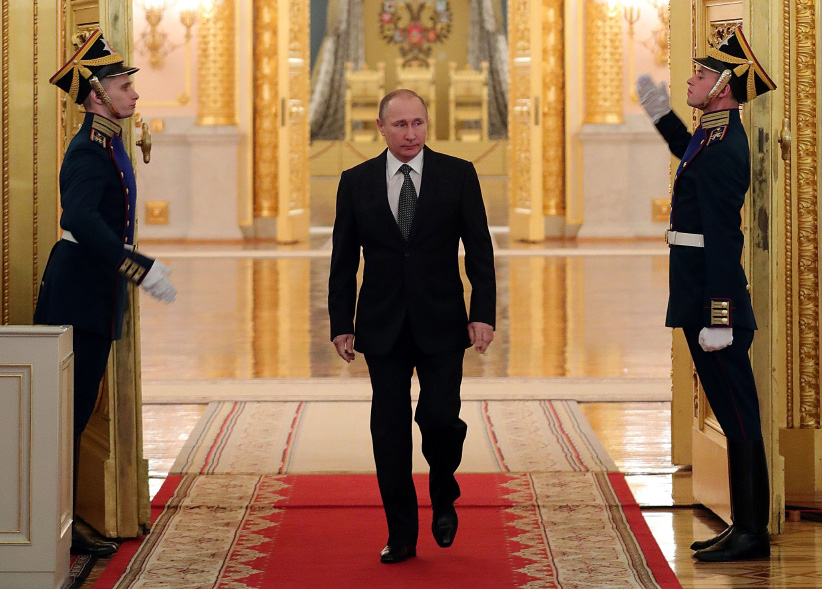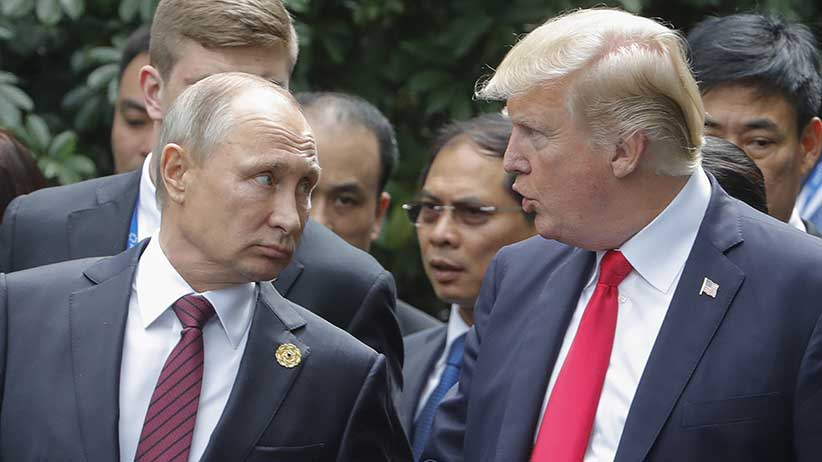How Putin’s absurd, tacky Russia isn’t so different from Trump’s America
Former GQ Russia editor Michael Idov says the nations share magical thinking and addiction to simplistic narratives
Russian President Vladimir Putin attends a meeting of the Presidential Council for Strategic Development and Priority Projects at the Kremlin in Moscow, Russia. (Sergei Ilnitsky/Reuters)
Share

Dressed Up for a Riot: Misadventures in Putin’s Moscow is Michael Idov’s intelligent, engaging account of the anti-Putin movement of the 2010s. The GQ Russia editor (2012-2014) turned film and television writer chronicles his years in Putin’s Moscow, peppering his account with flashbacks to his Latvian childhood and teenage years before immigrating to America. The 41-year-old author of The Humorist and Londongrad has an eye for the atmospheric in Russia. “I had been growing to enjoy extreme cold as a kind of cleanliness: it froze the fumes out of the air and the filth to the ground.” Moscow’s absurdity is conveyed in Idov’s story of how, as a DJ, he played U.S. group LCD Soundsystem for hipster protesters and hipster Putinists dancing together. “I closed the set with Pussy Riot’s latest, Putin Lights the Fires of Revolution, and people in Putin T-shirts danced to it. Perhaps their T-shirts were ironic—or their dancing was, or they thought I was for putting it on. None of this made sense, or a difference, anymore. The protests were done.”
Q: How might your book surprise and challenge readers?
A: Just about everyone attempting a memoir—especially about living in an exotic place during a tumultuous period—will be tempted to assign themselves, consciously or unconsciously, a somewhat heroic role. I tried to subvert this template totally: I am, in essence, the comic relief in my own story. While the events around me are momentous and sometimes tragic, with people jailed and beaten, my own struggles at the helm of the Russian GQ are petty, slight and—hopefully—funny. So, the challenge for the reader is to reconcile a serious study of the anti-Putin protest movement of the 2010s—and I believe this book to be the most informative on the subject, for the moment—with the outright comedy of my own ordeal.
Q: Is Russian life too complicated for the contemporary American? Are you still slightly agape at the absurdity of it all?
A: A little over a year ago, I would have answered in the affirmative. Now, with a demonstrably corrupt person at the head of the United States, I no longer can. If anything, Americans are learning the main lessons of living in a hybrid regime—that all institutions are just shells, that no real argument is possible once one side rejects the basic underlying facts—with an alarming speed. Here’s the thing, though: absurdity isn’t complicated. A lot of what we consider inscrutable is just ill-thought-out and shabby. So, I’m agape all right, but mostly at the sheer tackiness of it all.
Q: How is America more similar to Russia than Americans would like to recognize?
A: Magical thinking and addiction to easy, black-and-white narratives. The storyline underpinning literally everything in America is “all beings yearn for freedom.” Russia’s baseline narrative is “we’ll show them yet.” One grows from a scrappy colony’s idealism, the other from a former empire’s diminution. But the result is the same: two sides talking past each other in what amounts to little more than a self-therapy session.
Q: What do you think of the quality of the American media’s coverage of Russia’s attempts to interfere in the 2016 Presidential election? And Putin in general?
A: All I can say is Putin is currently the luckiest man in the world. He is what Gawker has once termed a “fameball,” writ global: once the narrative of his strategic brilliance has taken root, he barely has to do anything at all. After years of wasting millions on international PR firms like Ketchum and hare-brained homegrown projects like [English-language news channel] RT, tasked with “improving Russia’s standing in the world,” the Kremlin can just kick back and watch the entire Western press corps do the same job for free. Most upsetting to me, of course, are the glimmers of casual Russophobia in some of the coverage. Just like Russia’s modern anti-Western propaganda is actually more vicious than the Soviet Union’s (in the absence of a clear ideological split, the enemy is no longer the imperialist oppressing the “hard-working American people” but the Western culture itself), so the current wave of Russia reporting in the West often goes so far as to suggest that deceit and domination are somehow part and parcel of Russianness.

Q: “The Putin propaganda was not about providing a provable version of events but about making you mistrust all versions equally” is one of your book’s insights. Might he have learned this from the Republicans’ scorched-earth opposition to Obama?
A: I think this is standard KGB playbook, actually, and beyond that traceable all the way back to “divide and conquer.” It’s just that this tactic of maintaining status quo through sheer confusion has had some notable success on the global stage lately—the social networks turned out to be the absolute best vehicles for it.
Q: I enjoyed your commentary on Pussy Riot in Dressed Up for a Riot. Did Pussy Riot’s show trials convey the true nature of Putin’s Russia to the West? You quote New Yorker editor David Remnick’s line about band member Nadezhda Tolokonnikova’s closing statement during the trials, “A kind of instant classic in the anthology of dissidence.”
A: There is no “true nature of Putin’s Russia,” in as much as this nature changes according to the day’s agenda, with only one true purpose: the regime’s self-perpetuation. When it’s more expedient for the regime to present Putin as the sole guarantor of reason surrounded by maniacs, it will do that; when the role of the unpredictable madman brings more short-term tactical rewards, it will foam at the mouth as needed. In 2012—acting, I believe, in direct response to the late-2011 spate of protests—the regime decided to try on the “culturally conservative” mantle, massively empowering the Eastern Orthodox Church in the process. The Pussy Riot trial, with the prosecution reaching back to the Quinisext Council of 692 A.D. for precedent, was the apex of that short period. Note that we haven’t heard much from Patriarch Kirill after 2014: ever since the annexation of Crimea, the regime moved on to a different avatar, more Soviet-revivalist and thus less religious.
Q: “Russia’s like having a girlfriend or a boyfriend that you think will change if you just give them enough time, but that never happens,” Gary Shteyngart told me. Thoughts?
A: Gary is a wonderful human being and the world’s foremost expert on growing up Russian in Brooklyn, but his insights into Russia proper are those of a well-meaning and well-protected tourist. It’s telling that his metaphor for Russia here is a girlfriend and not, say, a horribly abusive parent.
Q: Could you elaborate on your argument that Moscow made you love New York City less?
A: Living in New York requires a fervent belief that you physically can’t live anywhere else—because otherwise, with places like Berlin and L.A. in the world, you’d have to come up with a better reason than that for paying the insane premium for staying there. This spell dissipates, however, once you’ve lived in one of these places for a year or two. Moscow is not one of them; I’d never swap New York for it. But my Russian peers’ mindless adulation, and imitation, of New York’s most superficial aspects gradually nudged me toward re-evaluating what it was I had loved about it in the first place. As a result, I’ve settled in Berlin as a kind of compromise between the two, and I love it—but as a result of all this moving around, I have a much weaker sense of home now than ever before. I’ve gone from “I can only live here” to “I can basically live anywhere.”
Q: What else do you hope people might take away from your book?
A: If nothing else, I would love it if my book helped deromanticize Russia without disparaging it. Russia is not America’s weird mirror, it’s not a magic place where Westerners might attain a deeper understanding of themselves, it’s not particularly great or malevolent in a way other countries aren’t. It’s just another country, perhaps a bit too vast for its good, subject to the same macro- and micro-processes as the rest. In some of these processes, it’s lagging behind the U.S. and the EU by a few years or decades, and in others sprinting slightly ahead. It’s got largely mediocre movies, excellent hip hop and terrible rock music, and a literature dragged down by the awesome weight of its own back catalogue
Q: What’s next?
A: I have just finished shooting my first movie as a director, a Russian-Czech-Latvian drama called The Humorist. It takes place in my hometown of Riga in 1984, and the main character is a famous Soviet comedian losing his mind. In a way, it’s a fictional distillation of the main themes from the book: freedom, censorship, privilege and futile revolt.
MORE ABOUT RUSSIA:
- Vladimir Putin: The return of the czar?
- Trump’s campaign colluded with Moscow. These 7 facts (and 27 footnotes) prove it.
- Donald Trump: Putin’s Manchurian Idiot
- Russia’s ‘propaganda outlet’ will remain on Canadian TV
- One picture, nearly 1,000 words: Trump and Putin shake on it
- What it’s like to be Russian in the U.S. right now